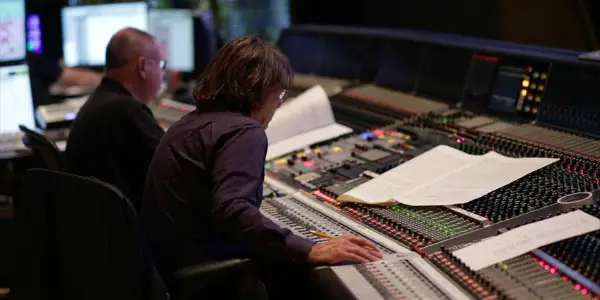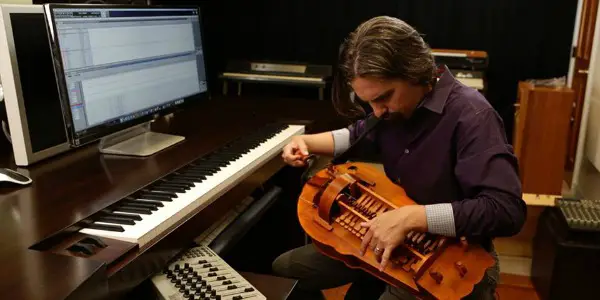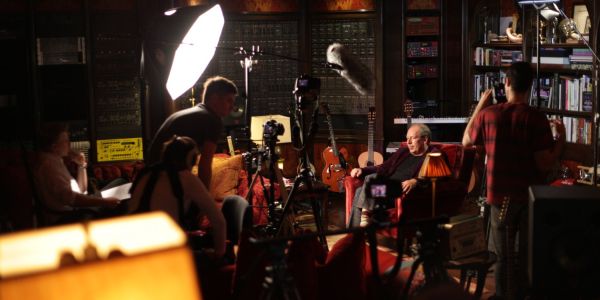Interview With Matt Schrader On The Making Of SCORE: A FILM MUSIC DOCUMENTARY

Alex Arabian is a freelance film journalist and filmmaker. His…
Approaching the release of his debut film, Score: A Film Music Documentary, writer and director Matt Schrader found some time to answer a few questions for Film Inquiry about his filmmaking process. Schrader is equally as eloquent as Score’s subject matter is. A man who grew up on the sound of John Williams, Schrader took a risk, left his job as an investigative journalist to embark on the methodic journey that led to this insightful documentary about film scoring.
Schrader’s succinctness of vision and intellectual curiosity payed dividends. So, how did he pull back the curtain and offer a glimpse into the elusive and majestic art form of film music? Among the many moving parts of making any film: Patience, diligence, and passion.
Alex Arabian for Film Inquiry: How did the idea to explore film music come to fruition?
Matt Schrader: Well, I’ve had this idea for a long time about a documentary about film composers, and it largely came from when you watch a bonus featurette, a lot of times they’ll do something on the score if it’s a well known score. And I remember watching all of these clips of, just little tiny fragments, of how a part the score was put together. They were put together in a way that didn’t really tell me how any of the process worked. Instead, they kind of played the music, and then showed the composer pressing some keys on a piano, but there was no narrative, really, to follow.
And I was really curious about how the composer goes about, one, coming up an idea in their head, for whatever film, and then, two, maybe even more interesting, how they take this idea in their head and turn it into a physical instrument, and eventually a recording. It took a little bit of refining to try to figure out what exactly the best way to approach that was. But at a certain point, I realized no one else was going to be doing this film, because they haven’t yet, and we’re in the golden age of documentary filmmaking, really.

I took a little bit of a chance. I left my job in the news world at CBS, where I did a lot of three-minute pieces, not 90 minute pieces and I took a chance. And I thought if this doesn’t work out, then I’ll try to find my way back into the news world. But I really wanted to see if composers would be willing to tell us their secrets. And to our surprise, they did. And we were able to get really good access. It was really fun, the whole process was fun, so the fact that other people liked it, too, is kind of just icing on the cake. But it was a really enjoyable experience just making it.
Speaking of the immense amount of talent you have featured, how were you able to secure so many interviews with so many great composers?
Matt Schrader: I think we ended up with 67 interviews that we actually shot, and most of them made the film, but it was patience, really. It took us a lot of time to interview these composers, because what they don’t tell you, and what I didn’t know, as much as I love soundtracks, what I didn’t know is that these composers are working on five or six or seven projects a year, which means every two months, they’re usually working on something else already.
They don’t really have a whole lot of time in between projects to work on someone else’s documentary or whatever. So we were reaching out to a lot of composers and they were very supportive of the idea, but a lot of the conversations were like, “Well, I’m working on Ridley Scott’s new movie and I don’t know when I’m going to get the time, but I’d love to this in a couple of months.”
So, sometimes it was just following up with people like that and finding a time that they could work with, as well. The other thing that you forget is these are artists, like any other artist, and their time is used to try to decompress a little bit, you know? It’s a very high pressure situation to have millions of dollars of a big budget studio film riding on whatever music you end up with, and everyone saying, “You better not ruin the movie!” Or similarly saying, “You’d better make the movie the greatest thing in the world.” There’s a lot of pressure there. Sometimes it’s hard to tap into the creative juices that get things going, but the time in between when they’re working on a project like that is valuable, you know? That’s when they get a chance to kind of reset their brain a little bit.
That was the other factor; we had to kind of work around their workflow, as well.
What’s your personal favorite score, or maybe the score that got you into discovering what makes the art form tick?
Matt Schrader: I’ll say that I think the ending of E.T. is about the most powerful ending of any movie ever. I think the reason that it works is because of the music. It leaves everyone on the edge of their seat and pulls the emotion out of you. We saw this a little bit in the parts that we were able to include in our film, but it’s an extremely emotional experience.

When you think about the fact that somebody wrote every single note that is causing our hairs to stand up on our arm, that’s an amazingly powerful thing. That there’s an artist that is creating the music that does something like that to millions of people, billions of people in some cases. And in E.T.’s case, it might be billions.
That is just such a cool thing and we knew that we had to go explore that as far as they would let us. And thankfully, they were able to share some really interesting stuff with us.
I’m sure it must have been a privilege to be a fly on the wall during some of these sessions.
Matt Schrader: Yeah, it was so cool. If we never made any film out of this experience, I would not have regretted it, because it was just such a cool thing to dive into for a few months. It’s like, some people might go on vacation for a few months, or go travel Europe for a few months, and I thought, if that’s the worst case scenario, is we go into the studios of all these cool people making music. And Abbey Road and AIR Studios and all these amazing [places]. It was a really, really cool experience for everyone involved and thankfully the movie’s not too shabby.
It was a wonderful and thoroughly enjoyable documentary. Honestly, the only thing I didn’t like about it was that it wasn’t 10 hours long because I was so immersed in the world that you created.
Schrader: Well, it started out that way. (laughs)
Was it always your idea to delve into the history of film music, beginning in the 1890s and the Lumière Brothers with Employees Leaving the Lumière Factory?
Matt Schrader: That is not a movie that would do very well nowadays. (laughs)
We were looking for what’s the best way to show the linear evolution, and then we realized that, a certain point, it’s not really linear. We’re talking about this art form. And everyone’s trying to lock those different ideas at the same time. Eventually, some of them take. “Hey, what about jazz music?” And then everyone’s like, “Oh! That was awesome. That worked really well. Let’s try jazz music.”
And then James Bond comes around. You start to see these evolutions take place and I think we tried to pick these pivotal moments in history where we saw the public understanding of how music is used in a film and how it affects us emotionally. We started to see that shift. And there’s a number of points like that where that happens, but I think the introduction of jazz is really a pivotal moment. And I also think that Star Wars was the rediscovery of the orchestra and how powerful an orchestra could be.
You know, orchestras had gotten kind of stale and old and it was thought of as old-fashioned. And then this cool new film comes out and everyone loves it and it’s new again and what’s this amazing sound that is coming out of the movie theater? That’s an orchestra! And you see this amazing revolution take place again.

I think that that has continued to spread. I mean, an orchestra is not just a way to make music. A composer uses an orchestra as a toolbox, and they see all of the different instruments and what they can do, particularly with emotions, and ways that they can manipulate themes or change the impact of something, and it allows for a lot of creativity like that. So I think that was a really interesting thing to explore.
Absolutely. Similar to the jazz revolution was the four-decades-later rock revolution, where rock starts being used, and you talk about it with Trent Reznor’s soundtrack to The Social Network, and rock musicians are doing scores now. That started a trend with scores like The Chemical Brothers’ Hanna and Eddie Vedder’s continued contribution of original film music after Into The Wild.
Matt Schrader: Oh, totally. I think it’s a lot of the same evolution taking place. But it’s transitioning from a different thing, moved to a different thing. And the cool thing is, we’re at this point now in history where we can actually look back what at all of the things that, the last 100 years especially, have brought us, artistically, and it’s amazing how many composers will look back to Bernard Herrmann and Jerry Goldsmith and they say, “Yeah, yeah, yeah, John Williams is fantastic, there’s no debate about that, but I liked what Bernard Herrmann did in Psycho. I really liked what Jerry Goldsmith did in Planet Of The Apes in the 60s.” And that’s a cool thing.
It’s [about] people that can be inspired by people that lived sometimes long before them, and you end up with kind of this accumulative musical knowledge that I think is evolving our understanding of what music can do. It’s this magical thing, the music that is created. And we still don’t really know how it works, but it works really well and it gets us amped up and it makes us sad and it gives us goosebumps.
It’s such a cool thing to explore, so I’m really grateful that we just had the chance to.
The fact that you managed to capture the emotional impact that even scientists still can’t 100% explain yet, and linger on that dopamine-infused feeling that film scoring begets is amazing.
Matt Schrader: Yeah, isn’t that [scientific aspect] crazy? That’s such a cool thing. At the very least, we just hoped people would enjoy the ride.
Have you ever considered turning Score into a docuseries? It definitely has that potential.
Matt Schrader: Yeah, we thought about it a little bit. It’s an option we’re kind of thinking about, but we’re probably a few months away in terms of making any kinds of decisions to pursue any further. We definitely could though, I think.
In the meantime, audiences around the world are strongly encouraged to experience Score: A Film Music Documentary, released June 16 by Gravitas Ventures. Regardless of Matt Schrader’s next project, with the success of his debut, he will likely have no trouble maintaining his new career as a filmmaker. Whatever the future holds for Schrader, it’s promising. For now, it is safe to say the writer and director deserves to enjoy the acclaim Score has been receiving and give himself a firm pat on the back.
Film Inquiry thanks Matt Schrader for his time, knowledge, and insight.
Does content like this matter to you?
Become a Member and support film journalism. Unlock access to all of Film Inquiry`s great articles. Join a community of like-minded readers who are passionate about cinema - get access to our private members Network, give back to independent filmmakers, and more.
Alex Arabian is a freelance film journalist and filmmaker. His work has been featured in the San Francisco Examiner, The Playlist, Awards Circuit, and Pop Matters. His favorite film is Edward Scissorhands. Check out more of his work on makingacinephile.com!













